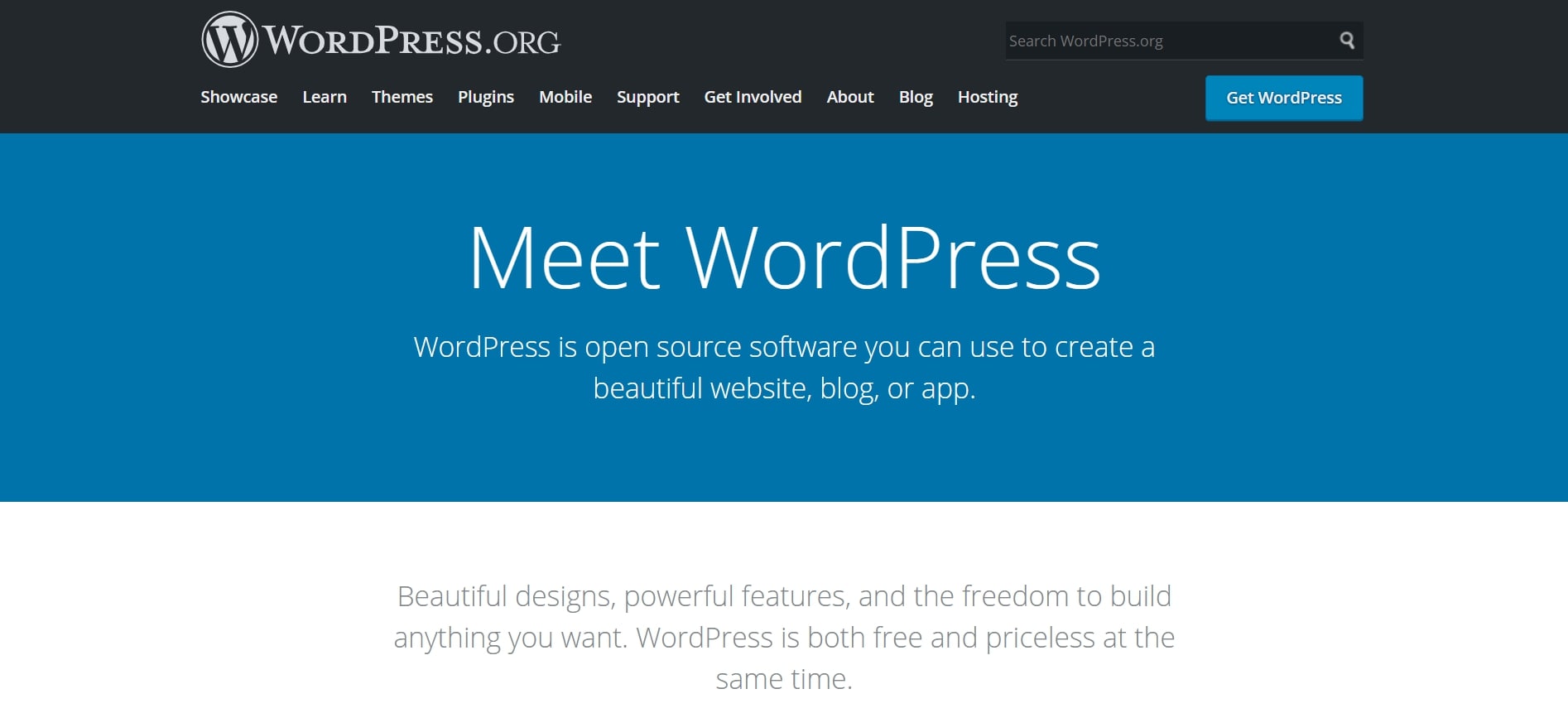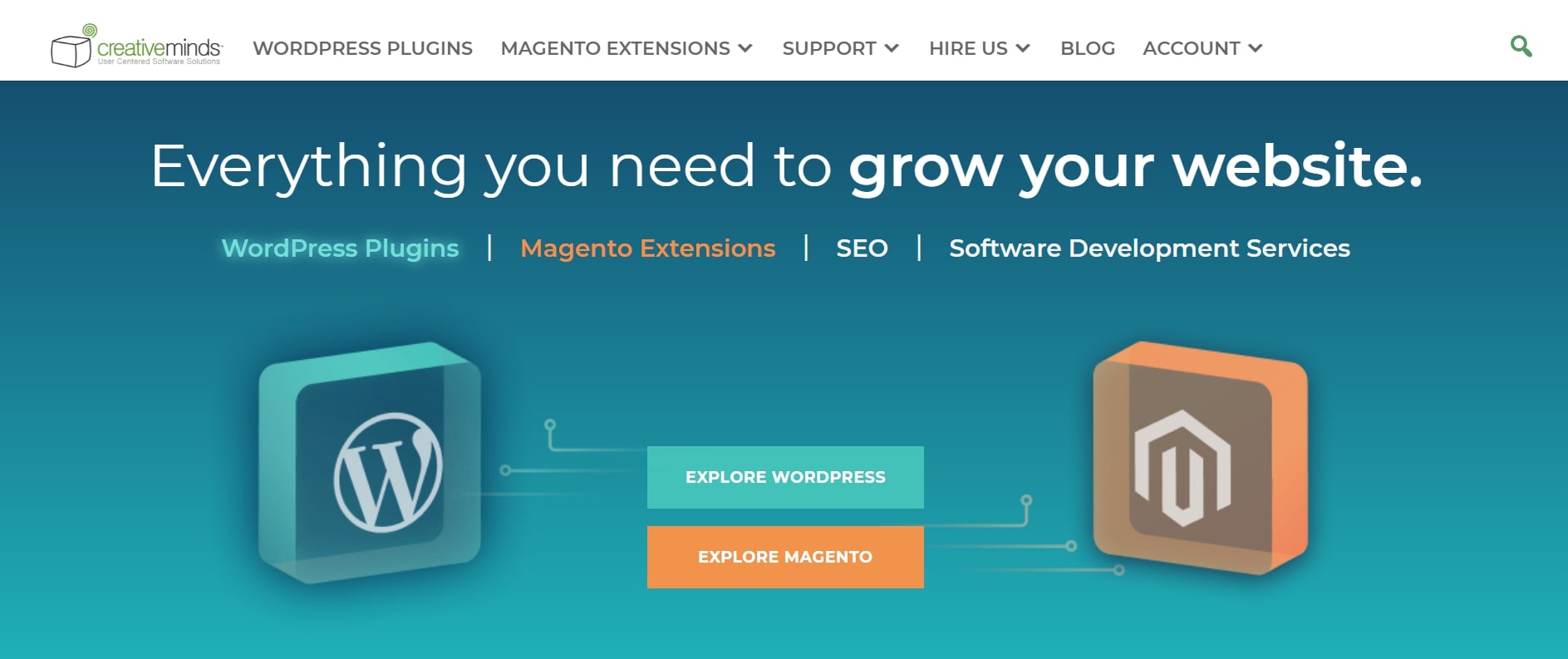Beginners tend to confuse WordPress.com and WordPress.org, which, more often than not, leads them to choose the one which is not right for ...
Beginners tend to confuse WordPress.com and WordPress.org, which, more often than not, leads them to choose the one which is not right for their needs. WordPress.com and WordPress.org are, in fact, two completely different website solutions offered by two different organizations.
To put it simply, WordPress.com offers a quick and free way to set up a site, with options to pay for functionality as the site and business grow. WordPress.org, on the other hand, offers advanced options and monetization from the start.
In the next few pages, we will delve deeper into the differences and similarities of both of these services to help you choose the right one for you and get you started on your journey of building an amazing website.
- These are the best WordPress hosting providers on the market

WordPress.com
WordPress.com is a website platform that comes with a web hosting service included in all of its plans. While not as popular or powerful as its counterpart, it aims to make the website creation process easier for beginners.
Since WordPress.com is fully hosted, users can simply sign up for an account and launch their site immediately without worrying about a hosting solution. It also provides a free website address out-of-the-box.
With WordPress.com, it’s possible to create a site at no cost and switch to a paid plan later for more resources.
WordPress.com offers five premium plans:
- Personal – $9/month.
- Premium – $18/month.
- Business – $40/month.
- eCommerce – $70/month.
- VIP – starting at $25,000/month.
Here are other advantages of using WordPress.com:
- Easy to manage – WordPress.com will take care of site maintenance jobs such as upgrading software, managing your web server, and securing your website.
- Requires minimal effort to start a website – setting up a WordPress.com site is straightforward since it already comes with hosting and a domain name.
- Suitable for bloggers – WordPress.com has all tools needed to start a fully functional blog, allowing users to get their site live and running in no time.
There also some negative aspects to consider before choosing WordPress.com, such as:
- Ads on free websites – if you start with the free option, your site will display ads from WordPress.com, making your website look less professional. You’ll need to upgrade to a premium plan to remove these ads.
- No monetization ability – users can’t monetize their site with WordPress.com’s free service unless they purchase its Premium option that costs $18/month.
- Limited access to plugins – you need to choose either WordPress.com’s Business plan or a more powerful one in order to install plugins on your website.
- Lack of customization options – when using the free service, you’ll have limited access to WordPress.com themes and customization options.
- Restricted access to the website stats – with the free plan of WordPress.com, users can’t install Google Analytics or other tracking platforms.
WordPress.com is an excellent platform for beginners to start a website for free. However, the service is quite limited when it comes to features, even if you’re on one of its premium plans. Unlocking the more advanced features requires a Business plan, which costs $40/month.
- We've also rounded up the best website builder

WordPress.org
WordPress.org is an open-source software that’s free to download and install. This CMS is highly customizable thanks to its wide selection of themes and plugins and is fit for any type of website, from blogs to eCommerce stores.
However, to use it to its fullest users need to purchase a domain name and a hosting service.
Luckily, many web hosts offer cost-effective WordPress hosting solutions. Some of them are:
- Hostinger – a great performance web host with an intuitive control panel. Their WordPress hosting plans start from $1.99/month. Check out our Hostinger review for an in-depth look.
- Bluehost – offers various hosting services, including WordPress hosting plans (opens in new tab) that start from $2.95/month. Our Bluehost review showcases the pros and cons of using this web host.
- GoDaddy – provides one-click installations for WordPress and other popular CMSs. This hosting company also offers four WordPress hosting plan options (opens in new tab), starting from £5.99/month. Read our GoDaddy review for more information.
Unlike WordPress.com, WordPress.org won’t display any ads on your site.
Here are more benefits of choosing WordPress.org:
- Flexibility – users are free to customize their site and improve its functionality using any themes and plugins they want. People with coding knowledge can also utilize their own templates and tools.
- A wide range of third-party plugins – there are thousands of tools available that integrate with the WordPress.org software, supporting or expanding such features as lead generation, SEO, and email marketing.
- Monetization – unlike WordPress.com, WordPress.org lets you run ads and sell products directly from your website.
- Supports scripts – WordPress.org users can add tracking scripts like Google Analytics on their site without limitations. This is a great advantage for those who want to use their site metrics to make data-driven decisions.
Before starting with WordPress.org, ensure you consider these aspects as well:
- Purchase a hosting service – it’s essential to look for a web host if you want to use this self-hosted platform. Thankfully, many hosting providers offer affordable and beginner-friendly plans, coupled with a one-click WordPress installation option and support.
- Responsible for website maintenance – WordPress.org users are responsible for their own backups and updates.
Although it might take longer to create a website with WordPress.org software, this platform offers more flexibility to build any kind of site you want.
- These are the best website design software solutions
Which one to choose?
Both WordPress.com and WordPress.org offer robust features, but the right platform for you depends on your website’s goals, budget, and skill set.
Let’s compare WordPress.com vs. WordPress.org based on their pricing, features, platform flexibility, security, ease of use, support, and monetization options.
Price
An important factor to look out for when picking your future website software is the price – it’s crucial to ensure that your budget can cover the upfront costs and long-term fees of using the platform.
People who want to spend little to no money on their sites can start with WordPress.com’s free plan – they will get up to 3 GB of disk space and a domain name with the .wordPress.com subdomain.
However, this option comes with WordPress.com’s branding ads, and users have to purchase a premium plan to remove them.
WordPress.com’s premium options for regular websites cost between $9-$70/month. All of these paid options include a free custom domain name during the first year.
The cheapest plan offers 6 GB of storage space, no branding ads, and the ability to upload audio files.
WordPress.com also offers plans for enterprises that start at $25,000/a year. These options include a content delivery network (CDN) hourly backups, and a GitHub repository.
As for using WordPress.org, you’ll need to look for a domain name and a web hosting provider before getting started.

If you go with a popular web hosting company, such as Hostinger, the prices will be lower than the WordPress.com premium plan
Hostinger’s WordPress hosting solutions range from $1.99-$9.99/month. With its lowest-tier plan, users will get 50 GB of storage space, 24/7 live chat support, and free WordPress themes and plugins.
It’s also possible to purchase a custom domain name from Hostinger, making it more convenient to keep and manage your hosting and domain registration in one place.
A custom domain name usually costs between $0.99-9.99/year. But users can get a free domain if they opt for Hostinger’s WordPress Starter plan that costs $2.99/month.
With WordPress.org, you’re free to start with the basic hosting plan and only upgrade it when your site grows and needs more resources.
If you’re a beginner and looking for a way to start a website for free, WordPress.com can be a good choice. However, if you intend to build a business website or any other large personal project without going over your budget, consider choosing WordPress.org.
Features
When picking a website platform, look for a service that will provide you with all the necessary features for your project, such as customization options, analytics, and SEO tools.
WordPress.com, for example, comes built-in with the essential features to build a fully functioning blog.

Its free plan also includes Jetpack, plenty of free themes to choose from, and the ability to make simple changes on your WordPress site template.
However, you’ll need to upgrade to WordPress.com’s Premium plan to access more templates and advanced design customization.
Unlike WordPress.com, WordPress.org lets you fully customize a website regardless of the hosting plan you choose. Using this platform, you’re able to modify your site through code and plugins and make full use of the best WordPress themes available on the internet.
WordPress.org users can also install and use Google Analytics straightaway to track site metrics like bounce rate, time spent on pages, and conversion rates.
Meanwhile, Google Analytics isn’t available on WordPress.com’s free plan and lowest-tier premium plan.
Both WordPress.com and WordPress.org have the same high-quality SEO performance. However, WordPress.org gives you more flexibility to make manual changes to improve your site’s SEO, thanks to the many plugins available.
It’s worth noting that WordPress.com only includes advanced SEO tools on its Business, eCommerce, and VIP plans.
With WordPress.org, users can customize and add tools to their sites from the start. On the other hand, WordPress.com requires web owners to upgrade to a higher plan to acquire more features and customization options.
- Check out our list of the best onpage SEO tools
Platform flexibility
Another difference between WordPress.com vs. WordPress.org is how each platform extends a site’s functionality.
With WordPress.org, you have full access to the code that powers this software, allowing you to create custom tools or implement any extra functionality to fit your needs.

The self-hosted WordPress.org also lets you install the best WordPress plugins to enhance your site’s performance. It’s also possible to use other free and premium third-party plugins from websites such as CreativeMinds.
On the flip side, plugins are only accessible on WordPress.com’s Business, eCommerce, and VIP plans.
For a simple website or blog, the built-in features of WordPress.com’s free, Personal, and Premium plans might suffice.
However, for those who want the freedom to modify their site without any additional payments, WordPress.org is the go-to choice.
Security
To ensure that your site is safe from malware and other cyber attacks, pick a platform that offers security tools out-of-the-box.
With WordPress.com, web owners won’t need to worry about any maintenance issues, as they will be automatically taken care of.
Moreover, users can’t access and modify their web server configuration, helping to protect their WordPress.com site from security risks.
WordPress.com also includes a pre-built SSL certificate on all of its plans, which will protect the site’s data and its visitors’ personal information.
WordPress.org’s system is also secure by default. However, users are responsible for updating the software regularly and taking care of backups on their own.
Thankfully, users can install some of the best WordPress security plugins to help with most security tasks.
Moreover, many hosting providers provide additional security features that help protect your WordPress site. For instance, Hostinger’s WordPress plan includes weekly backups, a free SSL certificate, and the Cloudflare DNS Firewall to safeguard a website from DDoS attacks.
Using WordPress.com means your site will be secure and easy to maintain from the start. However, WordPress.org gives more options to secure your website further.
Ease of Use
A website platform should also be easy to use, ensuring that anyone can build a website without having to master its intricacies and spend hours coding.
WordPress.com and WordPress.org offer a similar user experience and page builders for content creation. The difference is that setting up a WordPress.com site is quicker than starting a WordPress.org website.
With WordPress.com, users simply need to create an account from this platform’s official homepage. Then, they can pick a template from a collection of pre-made themes, make a few changes, and start adding content to the site right away.
Meanwhile, setting up a site with the WordPress.org software requires more steps, including registering a custom domain name and choosing a hosting plan.
Fortunately, many hosting companies like Hostinger provide a one-click installer, allowing users to install and create a WordPress.org site quickly.
WordPress.com is an excellent platform for those who want a hassle-free way of setting up a website. If you pick the right hosting provider, however, it should be as easy to create a website with WordPress.org.
Support
Support is another critical aspect to discuss when comparing WordPress.com vs. WordPress.org – it determines how fast and efficiently a user can get help when facing a problem.
WordPress.com offers different types of support for each of its plans. With the free service, users can only ask for help on the WordPress community forums.
Those who sign up for any of the WordPress.com premium plans will be able to access the email support. However, gaining assistance via the 24/7 live chat support will require upgrading to WordPress.com’s Business plan.
On the other hand, WordPress.org offers no direct support from the platform itself. Instead, it provides a community support forum and extensive documentation.
WordPress.org users can also get help from their web hosting provider. For instance, Hostinger offers 24/7 support via email and live chat, ready to lend a helping hand whenever you need them.
Other than that, users can learn from the many resources on the internet covering WordPress.org topics.
Those who are new to web development should consider using WordPress.org and picking a hosting provider with a support team that is available anytime. The open-source platform also has a large support community, offering a lot of self-help resources.
Monetization Options
If you want to generate income from your site, it’s crucial to choose a platform that offers several monetization options.
With WordPress.com, the choices to make money from a website are limited. Users on free and Personal plans can’t monetize their sites at all.
WordPress.com also places its ads on free sites without sharing the earnings with the web owners.

To integrate with monetization tools like Google AdSense and BuySellAds, users also have to upgrade to the Premium plan at a minimum.
Before you get to sell online, it’s also essential to sign up for WordPress.com’s eCommerce plan. This option lets you accept payments in over 60 countries, sell unlimited products, and integrate with top shipping carriers.
In contrast, the self-hosted WordPress version allows you to monetize your site in any way without restrictions, from selling physical items to embedding referral links into blog content.
Although it’s possible to make money online with WordPress.com, it’s much more efficient to use WordPress.org when building an online store or selling ad space on a website.
Which do we recommend?
Knowing the differences between WordPress.com vs. WordPress.org is crucial for deciding which platform to choose for your online presence.
In the end, the right choice will come from knowing your goals, budget, and skill set to determine which platform is the right choice for you. If you’re looking for great customization options and the ability to build any website that you imagine, then WordPress.org is the right choice for you. If you lack the technical knowledge and are looking to build a site using ready-made templates without worrying about the budget too much, then WordPress.com is your go-to platform.
- Also check out our complete list of the best web hosting services
from TechRadar - All the latest technology news https://ift.tt/WqvULBR
via IFTTT








COMMENTS